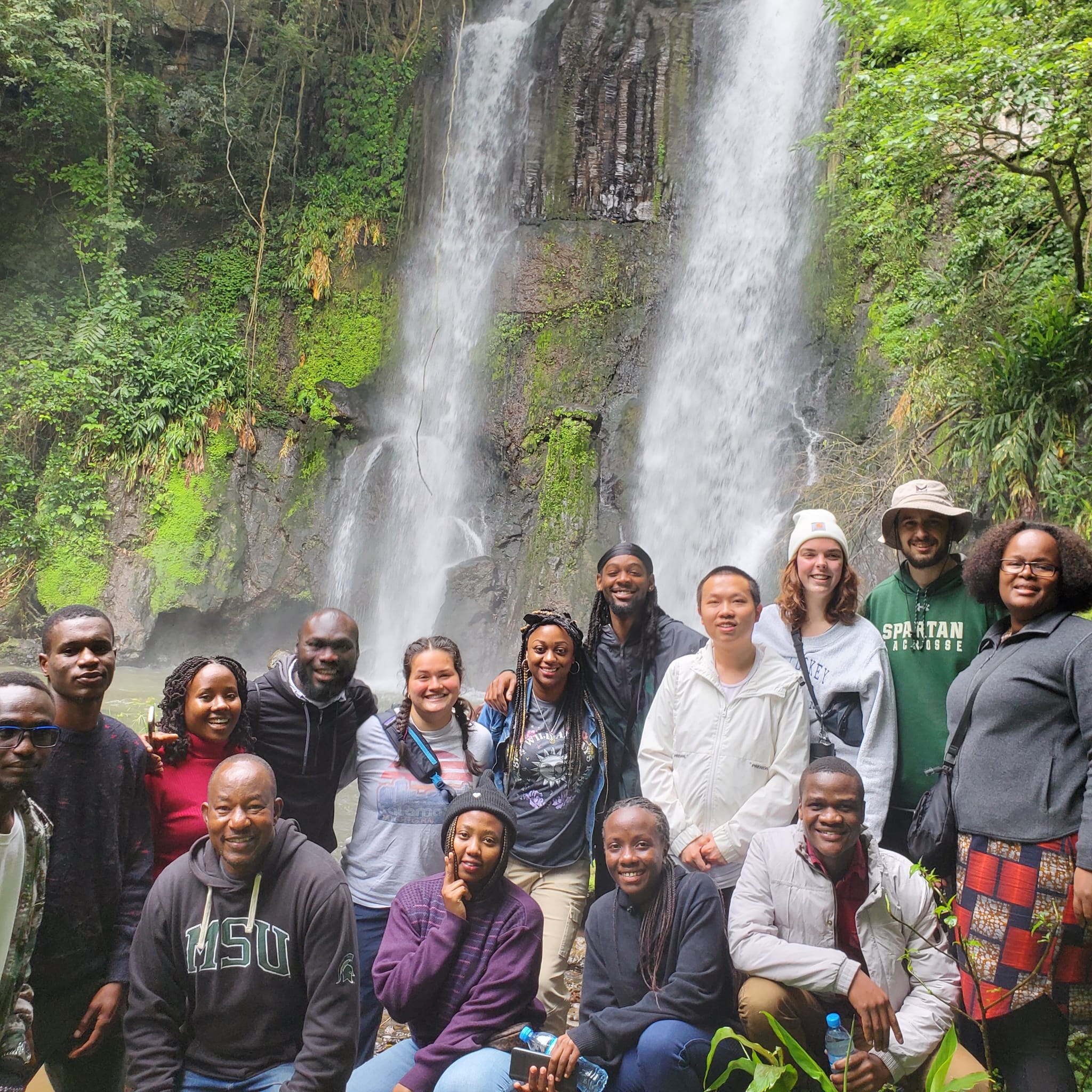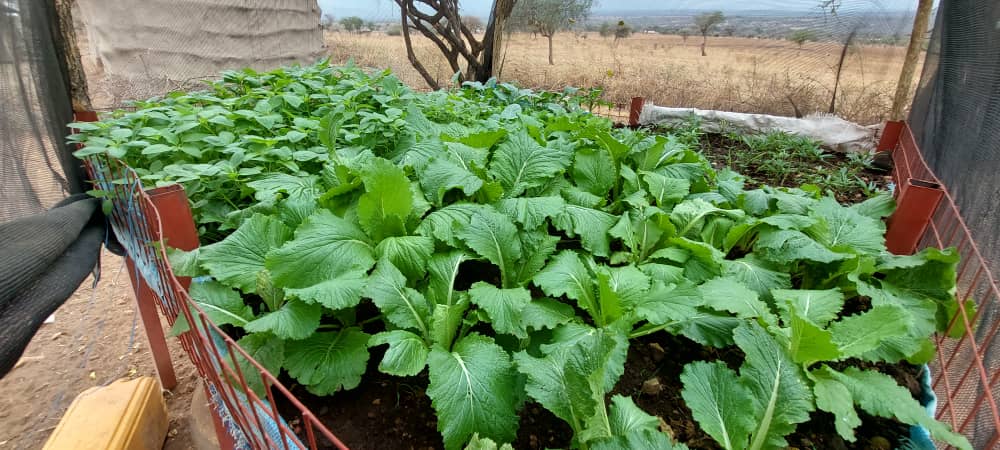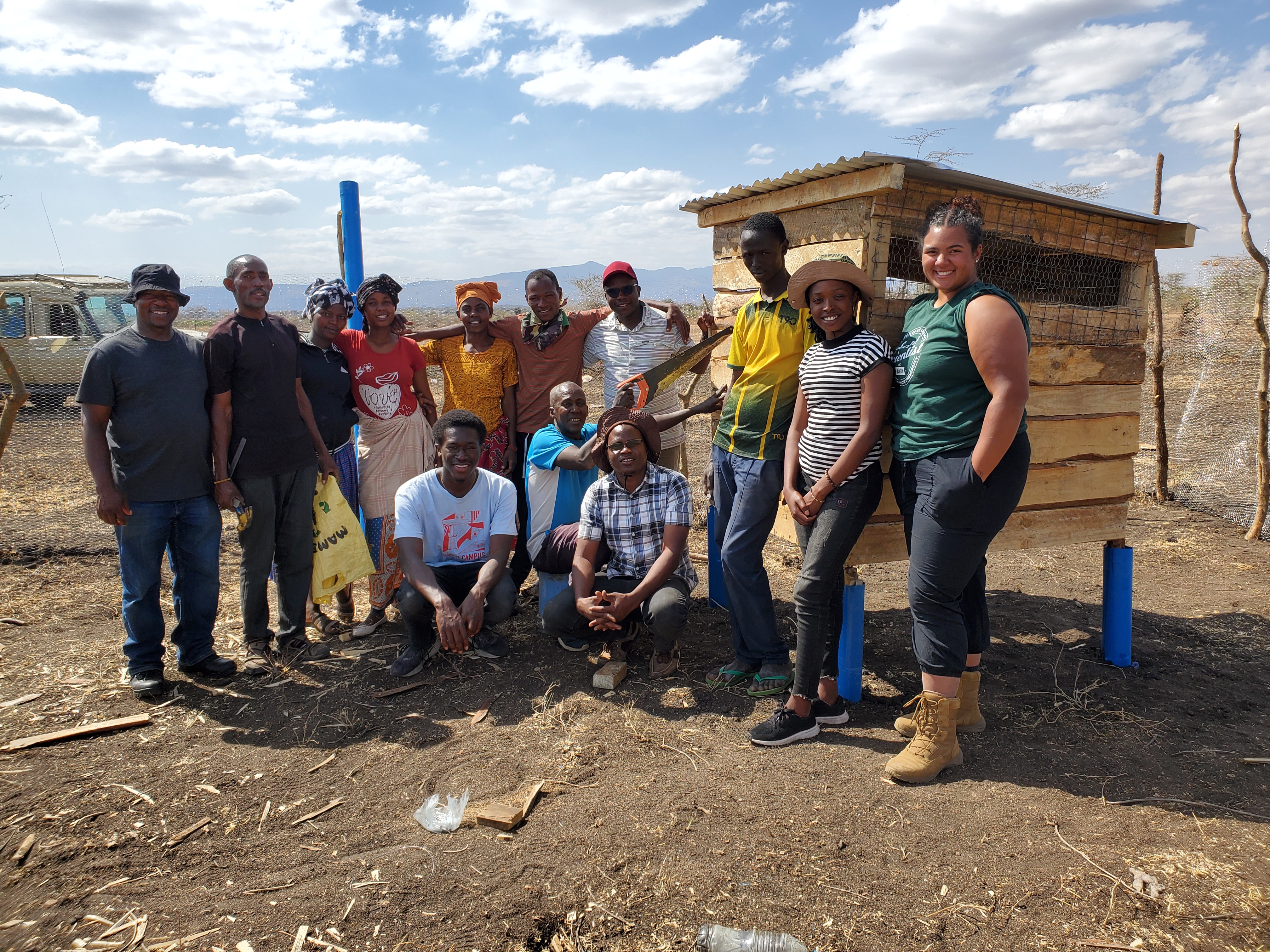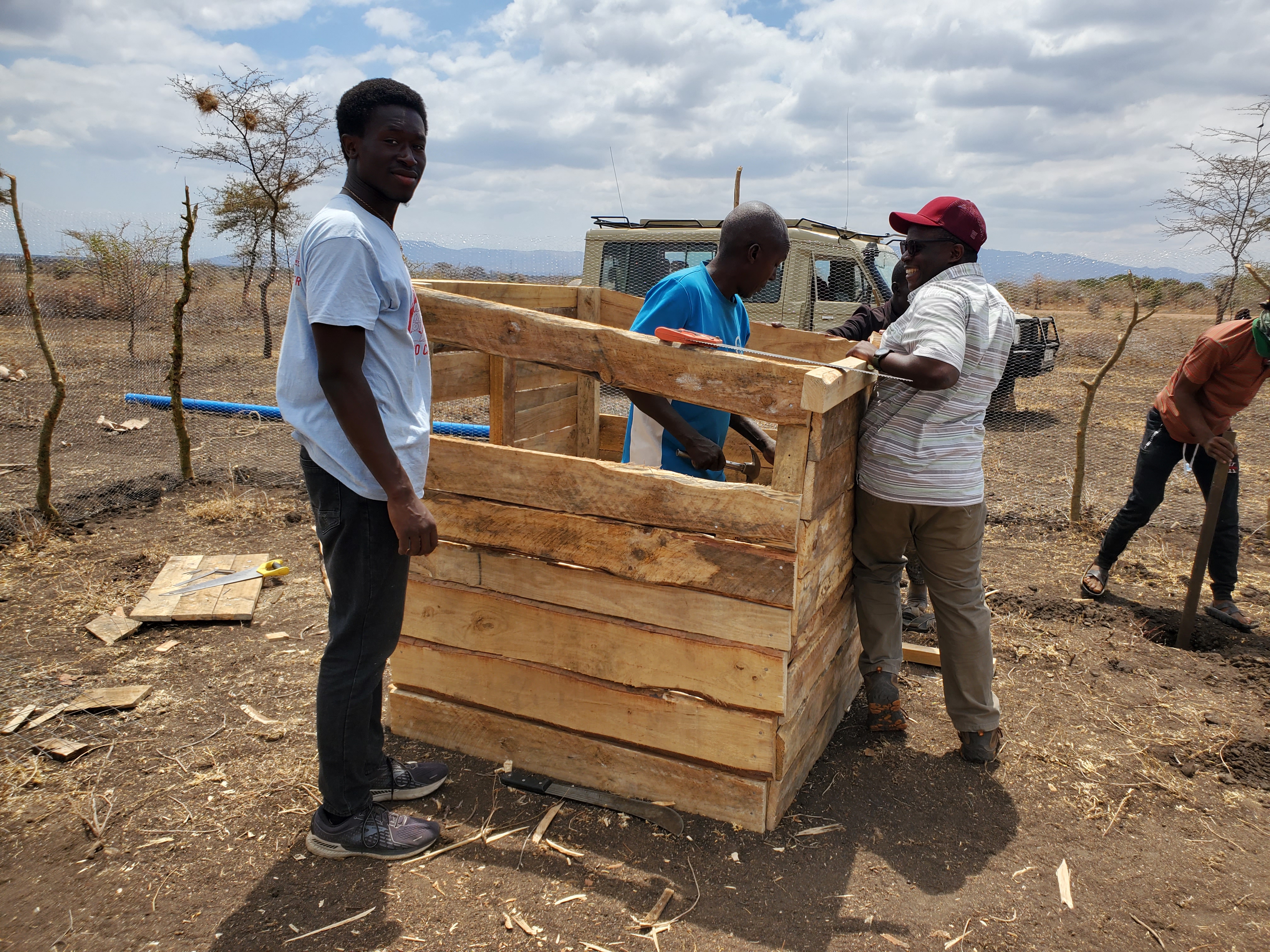From Chicken Coops to Community Gardens: MSU Students, Village Residents Co-Design Projects in Northern Tanzania
- Jonathan Choti, Ph.D.
- Associate Professor, Department of Linguistics, Languages, and Cultures
- College of Arts and Letters
Project Overview
- In a six-week study-abroad program, MSU students travel to Naitolia, Tanzania, where they work alongside peers to address priorities identified by village leaders and residents.
- Projects focus on community health, food security, youth empowerment, education, and environmental issues. The goal of the program is to improve livelihoods in the village.
Products/Outcomes
- MSU students exchange knowledge with their peers from Tanzania and gain cultural and language understanding by interacting with Naitolia residents, who set priorities for projects and co-design them.
- Examples of student projects include:
- Raised gardens with drought-resistant plants that provide a source of vegetables to improve the diets of village residents.
- Chicken coops that protect chickens from predators and reduce the incidence of disease, resulting in more egg production and more and healthier chickens.
- Health education programs for teenagers and their parents. Girls have been provided with sanitary pads and a storage area for them.
Partners
- Naitolia village leaders and families
- Sokoine University of Agriculture, Tanzania
- University of Dar es Salaam, Tanzania
- Jonathan Kivuyo, village-based program officer, Tanzania Partnership Program
- Mary Malekela, in-country program officer, Tanzania Partnership Program
Form(s) of Engagement
- Community-Engaged Service
- Community-Engaged Teaching and Learning
Having grown up in rural Kenya, Jonathan Choti understands the culture and way of life of the people of East Africa. As an associate professor, he imparts this knowledge to his students by teaching Swahili, along with courses focusing on African cultures, languages, and literature.
Each summer since 2015, he has led a study-abroad program where students from a variety of academic backgrounds—such as advertising, engineering, French, and history—live and learn with and from the people of Naitolia, northern Tanzania.

Jonathan Choti (front left, wearing MSU sweatshirt) is joined by students from MSU, the University of Dar es Salaam, and Sokoine University of Agriculture during a six-week study abroad program in Tanzania.
“Education is much more than the formulas we teach. It’s much more than the theories we teach,” said Choti, who sees the study-abroad program as an extension of his academic interests in African languages and cultures. “Education is much more about enabling all the people involved in our educational activities to be successful. Students and faculty from different backgrounds that work in this community can come together and engage with and help this community.”
Teaching, Learning, Service, and Scholarship
Called “Sustainable Community Development in Tanzania,” the six-week study-abroad program is an outgrowth of MSU’s Tanzania Partnership Program (TPP). TPP is a collaboration between MSU, the University of Dar es Salaam, and Sokoine University of Agriculture, both in Tanzania.
The goal of the study-abroad program mirrors that of TPP: to improve livelihoods in the villages of Naitolia and Milola, Tanzania, through research projects and development activities. These activities are done in collaboration with Tanzanian universities and village residents and leaders.
“MSU is collaborating with the international universities. Both universities are engaging with the two rural communities to improve lives,” explained Choti. “To make the collaboration complete, we are educating students so that teaching and learning can also take place in this community.”
MSU graduate and undergraduate students live and work alongside their Tanzanian peers. They form teams, working on priorities identified by the community: community health, food security, youth empowerment, education, and environmental issues.
“Any project we implement has to be identified by the community leadership, households, and the youth (young adults),” Choti said. “We look at the amount of money we have. Then we co-design the projects, in terms of materials and scope. We have to sit down together.”
A Long-Term Partnership
The village of Naitolia sits in a low-lying, arid area between two wildlife game parks populated by lions, elephants, cheetahs, leopards, giraffes, and more. The Masai people are primarily pastoralists and herders, raising cattle, sheep, and goats. The men feed and water the cattle, sometimes leaving home for weeks or months at a time in search of pastures. The women and children stay home, tending to milk-producing sheep and goats.
When students arrive in Naitolia, they are greeted by Jonathan Simon Kivuyo, who serves as TPP’s village-based program officer. Kivuyo had been a graduate assistant for the study-abroad program while earning his master’s degree from the University of Dar es Salaam.

Raised gardens provide an opportunity for village residents to grow drought-resistant vegetables that can be shared by families and sold as a source of income.
“My role is to oversee day-to-day development activities in areas of community health, food security, community education, youth empowerment, economic development, water resource management, and environmental issues,” Kivuyo said.
He facilitates the partnership between MSU students and village residents, introducing them to community leaders and residents, advising them on best approaches to projects, and teaching them about the culture and geography of Naitolia.
The students in turn survey residents about priorities and co-design projects with them. One project involved creating household vegetable gardens. Based on community input, the student teams designed raised gardens that would require less water and be protected from wild game and other animals.
Household Gardens
Naitolia resident Anna Joel has a flourishing home garden as a result of this collaboration. “The partnership between residents of the village of Naitolia and MSU has been long-term and mutual,” she said through a translator. “The two partners have been working together in identifying and tackling pressing issues in the community in the areas of health, education, and water.”
For the garden project, students in the Environment/Agriculture team worked alongside village residents, who contributed labor and materials. ECHO East Africa Impact Center, a nongovernmental organization, provided training to students and village residents about how to create, establish, and sustain the gardens.

Students from MSU, the University of Dar es Salaam, and Sokoine University of Agriculture worked as a team with Naitolia residents to build chicken coops. They are designed to protect chickens from predators and reduce the incidence of disease.
As a result, Anna Joel has been able to add vegetables to her family’s diet. In addition, she has shared them with neighbors and sold some, providing a source of income for her family.
To build on that success, Choti launched a project entitled “Improving Food Security in Naitolia Village of Northern Tanzania.” With partners Kivuyo and Mary Malekela of University of Dar es Salaam, he used grant funding to purchase drought-resistant vegetables, relocate gardens next to kitchens, and purchase liners for hafirs, trenches that collect water during the rainy season. He received $9,950 (2022) from the Network for Global Civic Engagement of MSU’s Residential College in the Arts and Humanities and $12,000 (2023) from MSU’s Creating Inclusive Excellence Grants. The goal is to provide residents with a sustainable source of vegetables that had been lacking in their diets.
Predator-Proof Chicken Coops
A second project emerged from discussions between the student Youth Empowerment Team and young adults in Naitolia. The young adults suggested building chicken coops. The reason: Their chickens had died due to disease or had been killed by wild animals such as snakes, foxes, squirrels, and birds of prey. They also asked for education on best chicken-rearing practices.
Working together, students and village residents created a design that would protect the chickens from predators. They contracted a carpenter to build 4-by-4 structures for five families and enlisted ECHO to provide training on coop maintenance, chicken vaccination, safety, and record-keeping.
The families that received the chicken coops in 2022 reported that they increased the number of chickens, which in turn produced more eggs. Families gave chickens to neighbors and relatives, with one trading excess chickens to buy a sheep. Five more families received chicken coops in 2023.
Other projects have included providing sanitary pads for teen girls and offering health workshops for teens, parents, and teachers.

MSU students help build a chicken coop in Naitolia.
Maddie Quintanilla, an MSU English major graduating this December, belonged to the health team. She and other students surveyed community members about their priorities. “They wanted soap and clean clothes. They wanted education on hygiene,” she said.
The team presented health workshops, distributed soap, and drove many miles to obtain sanitary pads.
Cultural Immersion
Quintanilla’s time there made a lasting impression, and she hopes to return as a graduate student. “I love exploring new cultures and getting immersed in other people’s lives,” said Quintanilla, who grew close to the Tanzanian students during her time there. “I’m so glad I got to witness another part of the world.”
Choti finds it personally fulfilling to witness the interaction between students and members of the village. “The students gain knowledge,” he said. “The community gets knowledge and new skills to improve aspects of their existence.” Students also produce scholarly outputs, presenting papers during their six-week stay, he said.
Choti’s own scholarship is rooted in this place. “My scholarship in African studies starts with my growing up in this area and understanding the cultures and customs and the values of the Maasai community in Naitolia,” he said. His mother lives in his hometown, a rural village in Kisii County of Kenya called Nyangusu.
Bringing students to Africa allows Choti to expand upon his classroom lectures and provide learning opportunities no video could capture. “When I bring students to Africa, we talk to people. They have Swahili lessons. The (MSU and Tanzanian) students learn from each other,” he said. “This is the best way to teach about culture.”
- Written by Patricia Mish, University Outreach and Engagement
- Photographs courtesy of Jonathan Choti
- Interview translation by Jonathan Kivuyo